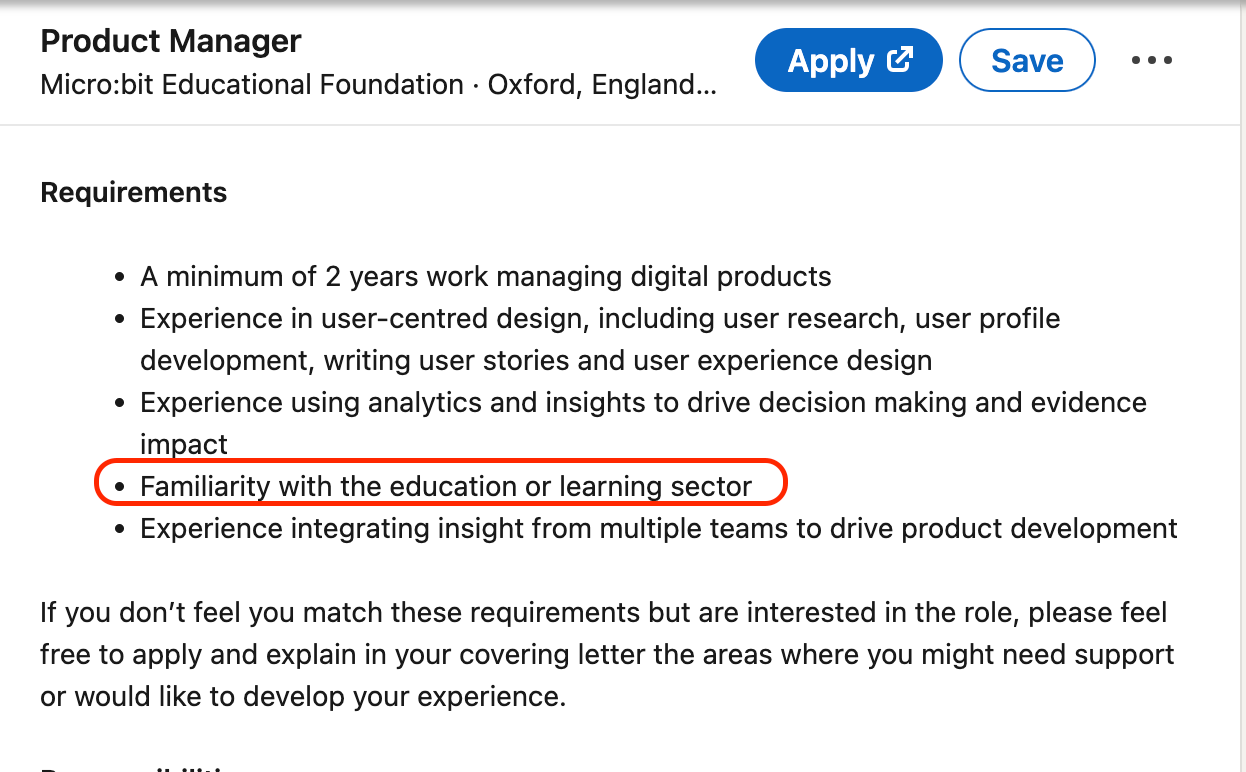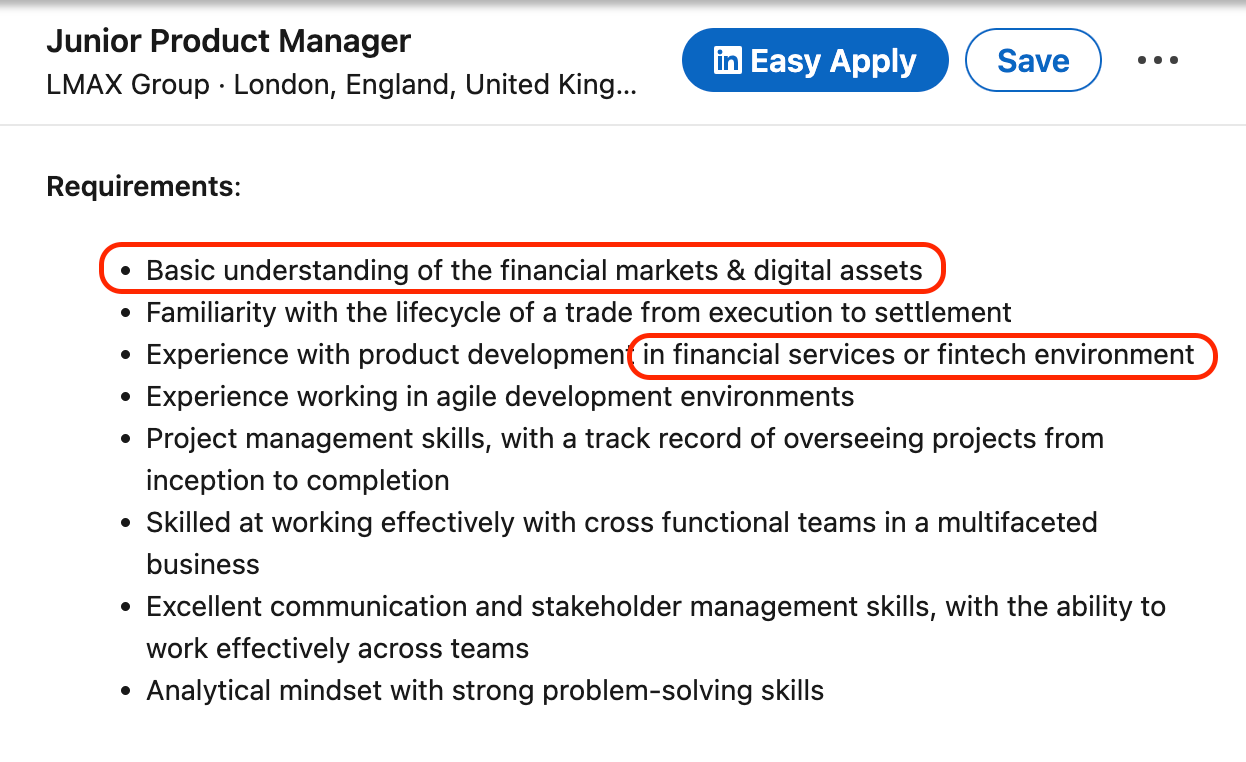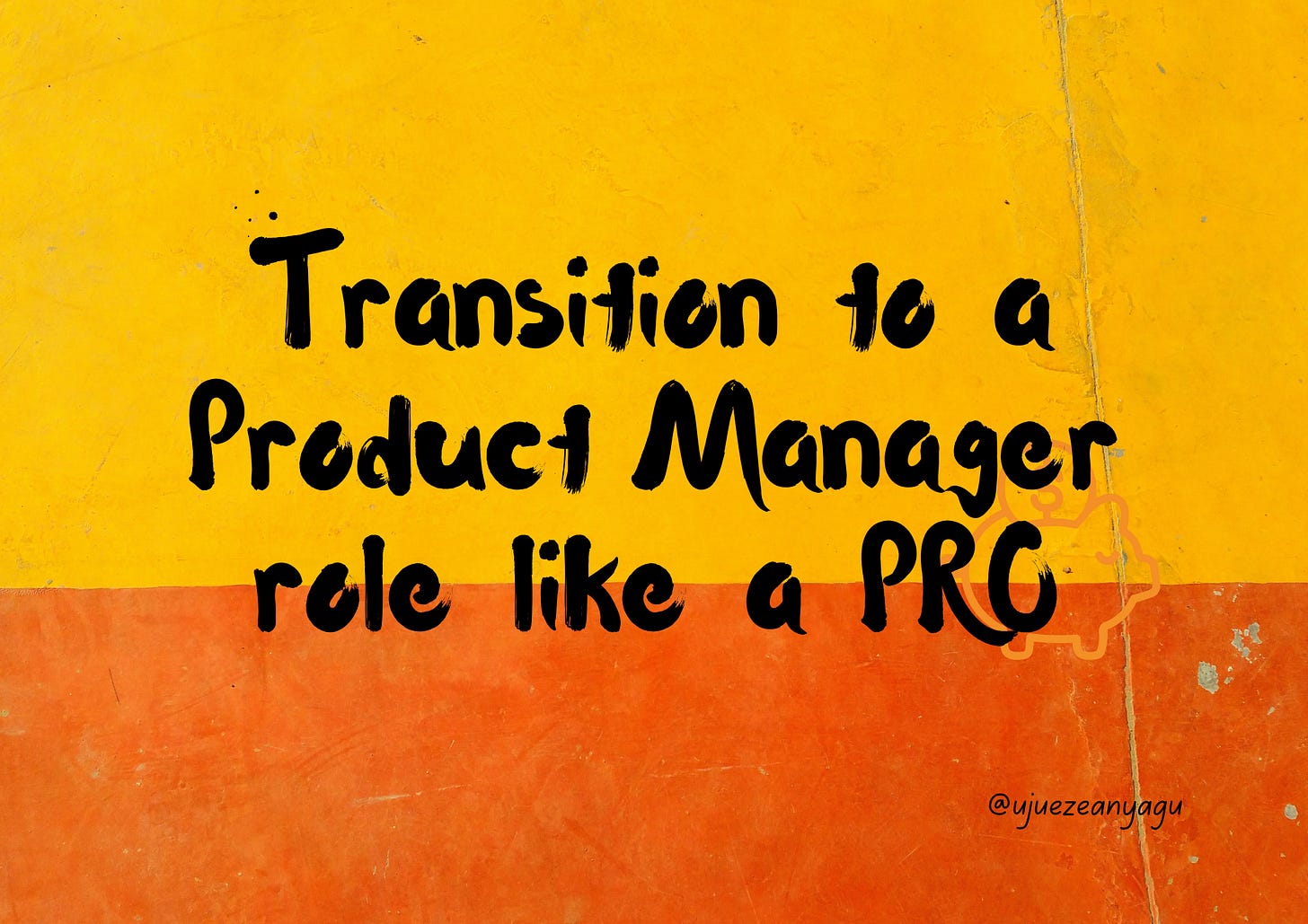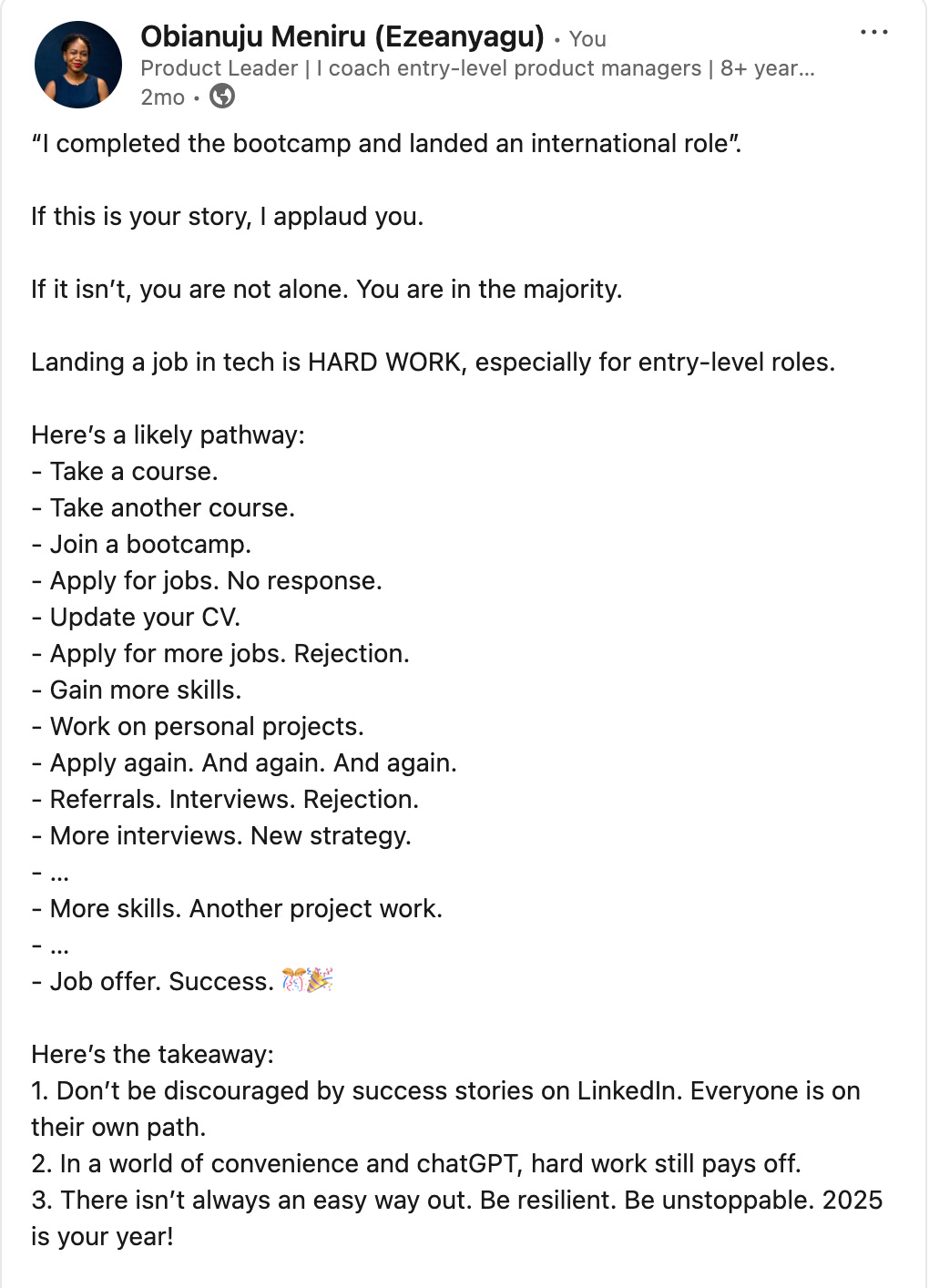Transition to a Product Manager role like a PRO
Ditch these common transitioning mistakes and land your first product manager job.
The role of a product manager
The product manager is responsible for building products that work for customers and the business. The product manager role is diverse and can take different forms based on the stage of the organisation and their needs. However, generally, a product manager is responsible for:
Gathering product requirements
Gathering customer and market insights to make product decisions
Developing and executing the product strategy
Product execution in collaboration with the design and engineering team
Ensuring stakeholder alignment
Is product management right for me?
Before you begin your transitioning journey, it’s important to assess if a product manager career is right for you. The role is sometimes “plagued” with
Dealing with a lot of ambiguity
Many meetings and conversations with stakeholders
Team members reaching out to you for non-related product manager tasks
Taking the blame for the team’s inefficiency
The expectation of team leadership without the official title, etc.
But there are great benefits such as:
The joy of seeing your product come to life and be used by your customers to accomplish great things
The opportunity to shape the future of an industry
Reasonable financial rewards
Transitioning to a product manager role can take a week or 2 years (unfortunately!). You want to be well-informed about the role before you begin your transitioning journey.
Transitioning paths
Here are some paths to pivoting to product management and landing your first job.
Apply for product manager jobs
While in your current position or out of work, apply for product manager jobs. Pay more attention to jobs that align with your previous experience. Start applying even when you are not ready, as this will help you familiarise yourself with recruiters’ expectations.
Transition within your organisation
If you work in a technology firm and want to transition to a product manager, let your manager know your intentions and take opportunities to learn product management skills within the organisation. Volunteering for product-related tasks can demonstrate your expertise and readiness, even without a product manager title.
Transition to product-related roles
Explore opportunities related to product management, such as Scrum Master, User Researcher, Project Manager, Product Owner, Business Analyst, Quality Assurance Tester, etc. These are reasonable paths to building a career as a product manager. Fun fact: I pivoted to a business manager role before transitioning back to product management.
Volunteer for product manager jobs
Volunteering is a transitioning path if you have a full-time job and are still learning product management. Volunteer roles are often flexible and allow you to have part-time work opportunities. It’s also a good opportunity to build work experience while deepening your skills. Learn more about volunteering in tech here.
Start a company
Don’t let the word ‘company’ scare you. Starting a company simply means building a product you own. You can partner with software engineers to build the product or use no-code tools such as Lovable, Softr, Bubble, etc. I’d recommend working with a small team to build the product because it allows you to practise product management skills in a team, which reflects the day-to-day of your future role.
Common mistakes when transitioning
Avoid these common mistakes when pivoting to a product manager role:
It’s the “product manager” role or nothing
Don’t get stuck on the “Product Manager/Associate” title. Many folks transition from product innovation-related roles into product management at later stages of their career; some even transition to Senior product roles. If you only apply to roles with the Product Manager job title, you may miss opportunities that could lead to you having a successful career in product innovation.
Focusing too much on learning and less on doing
If you think you must learn everything before you begin your first project or job, that’s a mistake. 5+ years into my product management career, I’m still learning. Projects and on-the-job work help to solidify and deepen your skills. Also, product management recruiters often appreciate your project experience more than multiple certifications.
Focusing on what you lack rather than what you can offer
“I don’t have technical experience.”
“I don’t have product manager work experience.”
“I don’t have UK work experience.”
“I don’t have fintech experience.”
Most often, these are legitimate concerns. However, focusing on what you lack rather than what you can offer is another common mistake. You may not have programming experience or technical skills, but you have deep marketing experience, which could be invaluable for a product that is near launch.
Ignoring soft skills
People hire people they like. Unfortunately, many transitioners ignore or underestimate the power of applying soft skills and focus solely on demonstrating their technical ability. Your attitude to work becomes even more important when you do not have the required product management experience.
When you don’t demonstrate the right attitude in challenging circumstances, take initiative in your current role, or have positive relationships with leaders in your organisation or network, colleagues will likely not refer you for new opportunities.
Not giving it their best shot
You may know someone who transitioned and landed a job in a few months, so you have similar expectations. The reality is that transitioning to a new career is often challenging. It requires grit to tackle various challenges and find solutions.
How to transition to product management
Identify your transferable skills
Transferable skills are critical elements of your transitioning journey.
As an experienced professional, you’d have valuable skills for product management roles. This may include …
Soft skills: Problem-solving, Communication, Critical thinking, Empathy, Stakeholder Management, Adaptability, Negotiation, Leadership, etc.
Hard skills: Data analysis, Project Management, Software Design & Engineering, Agile & Scrum Methodologies, Go-To-Market Strategy, User Research, User Experience, etc.
Domain knowledge: Business and Finance Acumen, Legal & Compliance Awareness, B2B, B2C or B2B2C Domain Experience, etc.
Technology: Mobile Technology, Artificial Intelligence, Blockchain, etc.
This is not an exhaustive list. Identify your skills and how you can demonstrate them in your job applications.
Develop essential skills
It’s okay to not have all the required skills for a job and still apply. However, if certain skills such as technical knowledge or data analysis consistently appear in job requirements, take practical steps to acquire them. You can explore platforms like Coursera, Udacity, LinkedIn Learning, Udemy, etc. or training schools. Volunteering is also a great opportunity to learn new skills without the pressure of full-time paid employment.
Make your intentions known
If you work in a technology organisation that requires product manager skills (even if they don’t have such a role now or an open position), inform your manager and trusted colleagues. They could consider/recommend you for the job if an opportunity arises.
Build your portfolio. Track & communicate your wins
A portfolio is a collection of product-management-related projects. It’s a tool to demonstrate your expertise to recruiters, especially when you have no official ‘Product Manager’ title. I also recommend creating a brag sheet to track your wins. A ‘brag sheet’ is a personal document where you write your wins to improve your resume, build a case for your transition/promotion or simply remind yourself of your abilities when imposter syndrome kicks in. Here’s a guide on how to create a ‘Brag sheet’.
Explore jobs that align more with your skills/experience
If you have experience in a sector (industry, technology, etc.), you’ll likely have an edge over other candidates. Exploring jobs that align with your previous experience could be highly beneficial. For example, if you are transitioning from a software engineering role, explore technical product management jobs; if you’ve worked as a part-time teacher, explore product manager-related roles in education technology.


Join communities
Being part of a product community can accelerate your transition as you are exposed to insights, trends, and best practices. Communities offer an opportunity to engage in discussions, find useful events/learning sessions, network with professionals and discover job opportunities that aren't publicly advertised.
Remember that the value in communities is active participation rather than passive attendance.
Seek mentorship
Learning from an experienced product manager can provide invaluable guidance tailored to your career goals. A mentor helps you navigate challenges, refine your skills, and offer strategic advice on breaking into the field—whether through structured mentorship programs or informal connections with industry professionals.
Platforms like ADPlist connect you with hundreds of mentors across the world. You can also connect with me for mentorship.
When you are ready, I can help you achieve your product manager career goals in 3 ways:
Get the book titled “Impressive CV Writing for Entry-level Product Managers from Diverse Academic and Work Backgrounds” here.
Join a free online community of aspiring and entry-level PMs. Learn from experienced PMs and recruiters, ask a question, stay informed about job opportunities and get access to curated resources. Join here.
1-1 mentorship: Get 1-1 mentorship from an experienced professional to land your first PM job, develop your skills and or grow professionally as a PM. Email me at ezeanyaguuju@gmail.com to learn more and book a session.




Great insights!